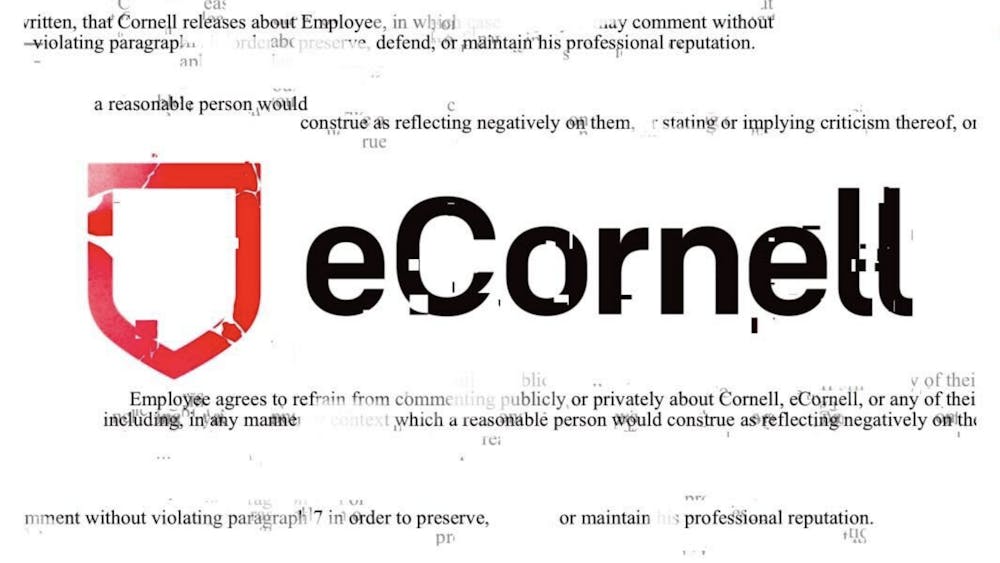The Cornell administration presented the first of a series of talks and events titled “Pathways to Peace” on Monday, March 10, at Bailey Hall. This panel discussion featured moderator Ryan Crocker, former United States Ambassador to Afghanistan, Iraq, Pakistan, Kuwait and Lebanon, along with participants Tzipi Livni, former Foreign Minister and Vice Prime Minister of Israel; Dr. Salam Fayyad, former Prime Minister of the Palestinian Authority; and Daniel B. Shapiro, former United States Ambassador to Israel.
Billed by the Cornell administration as a presentation of diverse opinions about the war in Gaza in order to explore a “pathway to peace,” the event was, in effect, an erasure of the suffering of the Palestinian people in the Occupied Territories, over the last century under the Israeli occupation and a complete omission of any Israeli accountability for the killing of, conservatively, 50,000 Gazans (70% women and children), including 15,000 children, with another estimated 25,000 children injured, and 14,000 people missing, presumed buried under rubble; the massive destruction of Gazan cities and neighborhoods, most levels of infrastructure; and the cruel suppression of water, food and electricity to innocent civilians. None of this was mentioned but referred to only generally as “the war.”
The carnage in Gaza was repeatedly presented by Livni with Shapiro’s concurrence as “collateral damage” in Israel’s self-defense against “terrorism,” indicating that Israel’s massive retaliation in Gaza has been justifiable given the attack by Hamas on Israeli border settlements and the Nova music festival and its 1,175 victims: 725 civilians, including 36 children, 71 foreign nationals, and 379 member of the Israeli security forces.
Dr. Fayyad, the only Palestinian on the panel, restricted his comments to a metacritique of Palestinian leadership as a key issue and gave some assessment about the various “peace plans” over the last 75 years, faulting and praising both the Palestinian and Israeli leadership for various efforts. There was, then, no one on the panel who spoke to what Palestinian scholar Rashid Khalidi has called “the 100 years war against Palestine,” which provides the context, though not the justification, for the Oct. 7, 2023 attack by Hamas.
Ignoring the decades of oppression of Palestinian civilians by Israel in Gaza and the West Bank, both before and after Oct. 7, 2023, panelists repeated that Oct. 7 was the beginning of the current “war.” Unfortunately, protestors, who were escorted out by Cornell police and some charged with disorderly conduct, raised the only voices giving any indication that Palestinians continue to die and Israel is facing accountability before the International Court of Justice for what the Court terms a “plausible” genocide, for which such international bodies as Amnesty International, Human Rights Watch, the United Nations Independent International Commission of Inquiry and Doctors Without Borders have also charged Israel.
Cornell President Michael Kotlikoff framed the presentation as a unique opportunity for getting experts with a diverse set of opinions and “wisdom” together to discuss the issues.
However, it’s difficult to see how any discussion of peace can credibly take place when there is no voice representing the liberation of the Palestinian people.
Eric Cheyfitz is the Ernest I. White Professor of American Studies and Humane Letters, professor of American Indian and Indigenous Studies, and director of Graduate Studies, American Indian and Indigenous Studies Program. He can be reached at etc7@cornell.edu.
Darlene Evans is an Emerita Senior Lecturer at the Knight Institute for Writing in the Disciplines. She can be reached at dme27@cornell.edu.











